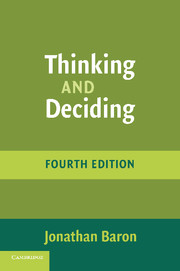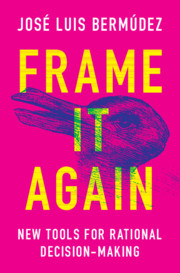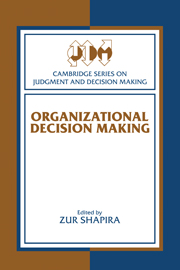Judgment and Decision Making as a Skill
Learning, Development and Evolution
- Editors:
- Mandeep K. Dhami, University of Cambridge
- Anne Schlottmann, University College London
- Michael R. Waldmann, Georg-August-Universität, Göttingen, Germany
- Date Published: February 2012
- availability: This ISBN is for an eBook version which is distributed on our behalf by a third party.
- format: Adobe eBook Reader
- isbn: 9781139200196
Find out more about Cambridge eBooks
Adobe eBook Reader
Other available formats:
Paperback, Hardback
Looking for an inspection copy?
This title is not currently available for inspection. However, if you are interested in the title for your course we can consider offering an inspection copy. To register your interest please contact [email protected] providing details of the course you are teaching.
-
This book presents a comprehensive review of both theories and research on the dynamic nature of human judgment and decision making (JDM). Leading researchers in the fields of JDM, cognitive development, human learning and neuroscience discuss short-term and long-term changes in JDM skills. The authors consider how such skills increase and decline on a developmental scale in children, adolescents and the elderly; how they may be learned; and how JDM skills can be improved and aided. In addition, beyond these behavioral approaches to understanding JDM as a skill, the book provides fascinating new insights from recent evolutionary and neuropsychological approaches. The authors identify opportunities for future research on the acquisition and changing nature of JDM. In a concluding chapter, eminent past presidents of the Society for Judgment and Decision Making provide personal reflections and perspectives on the notion of JDM as a dynamic skill.
Read more- Proposes a conception of human judgment and decision making, seeing it as a dynamic skill rather than a static capacity
- Provides a comprehensive and up-to-date review of the theories, research and methods from various areas of psychology (evolutionary, neuro-, developmental and learning) employed in understanding changes in human judgment and decision making
- Identifies areas of potential future research in the acquisition and changing nature of judgment and decision making, and outlines innovative methods that can be used
Reviews & endorsements
'Research on judgment and decision-making has been limited by a narrow focus on the content-blind rules of probability and utility with their assumptions of certainty. Exploring far beyond these limits, this informative volume demonstrates that there is more to good judgment than probability: it investigates rules of conversation, evolved capacities, smart heuristics, and other skills that can deal effectively with the uncertainty in our world.' Gerd Gigerenzer, Director of the Center for Adaptive Behavior and Cognition (ABC) and Director of the Harding Center for Risk Literacy, Max Planck Institute for Human Development
See more reviews'This work presents pioneering chapters on an emerging perspective of Judgment Decision as a learned skill that begins early in childhood and keeps developing throughout the life span. This conceptual liberation from the long-dominant static concepts of rationality and biases leads into the real world of Judgment Decision - motivated and dynamic.' Norman Henry Anderson, Distinguished Professor Emeritus, University of California, San Diego
'… Dhami, Schlottmann and Waldmann have produced an important [book]. There is a lot of original thinking and new evidence here that has the potential to move the field of JDM into the front line of psychological science …' Joachim I. Krueger, American Journal of Psychology
Customer reviews
Not yet reviewed
Be the first to review
Review was not posted due to profanity
×Product details
- Date Published: February 2012
- format: Adobe eBook Reader
- isbn: 9781139200196
- contains: 27 b/w illus.
- availability: This ISBN is for an eBook version which is distributed on our behalf by a third party.
Table of Contents
Part I. Evolutionary and Neural Bases of JDM:
1. The evolved foundations of decision making Andreas Wilke and Peter M. Todd
2. Neural bases of judgment and decision making Oshin Vartanian and David R. Mandel
Part II. Developmental Approaches to JDM:
3. Judgment and decision making in young children Anne Schlottmann and Friedrich Wikening
4. Judgment and decision making in adolescents Wändi Brunie de Bruin
5. Aging and decision skills Ellen Peters and Wändi Brunie de Bruin
Part III. Learning JDM:
6. Learning of judgment and decision-making strategies Rui Mata and Jörg Rieskamp
7. Casual models in judgment and decision making York Hagmayer and David A. Lagnado
8. Learning judgment and decision making from feedback Nigel Harvey
Part IV. Improving and Aiding JDM:
9. Improving judgment and decision making through communication and representation Peter Sedlmeier and Denis J. Hilton
10. Aiding judgment and decision making J. Frank Yates and Andrea M. Angott
Conclusion:
11. Perspectives on judgment and decision making as a skill Mandeep K. Dhami, Anne Schlottmann, Michael R. Waldman, James Shanteau, Thomas S. Wallsten, Baruch Fischhoff, Irwin P. Levin (with Joshua A. Weller and Elaine A. Bossard), Valerie F. Reyna, Jonathan Baron, Robin M. Hogarth, Joshua Klayman and Michael H. Birnbaum.
Sorry, this resource is locked
Please register or sign in to request access. If you are having problems accessing these resources please email [email protected]
Register Sign in» Proceed
You are now leaving the Cambridge University Press website. Your eBook purchase and download will be completed by our partner www.ebooks.com. Please see the permission section of the www.ebooks.com catalogue page for details of the print & copy limits on our eBooks.
Continue ×Are you sure you want to delete your account?
This cannot be undone.
Thank you for your feedback which will help us improve our service.
If you requested a response, we will make sure to get back to you shortly.
×



